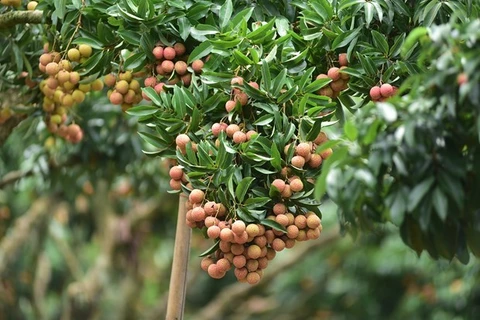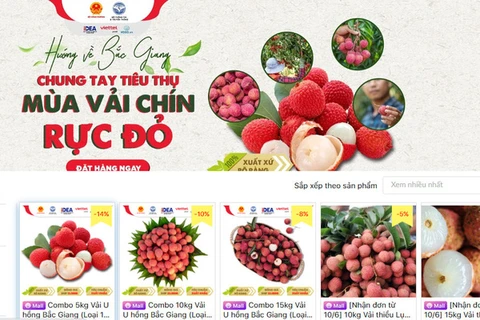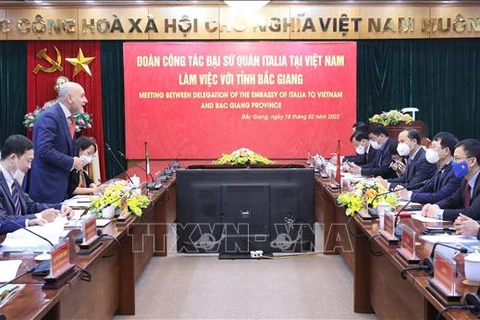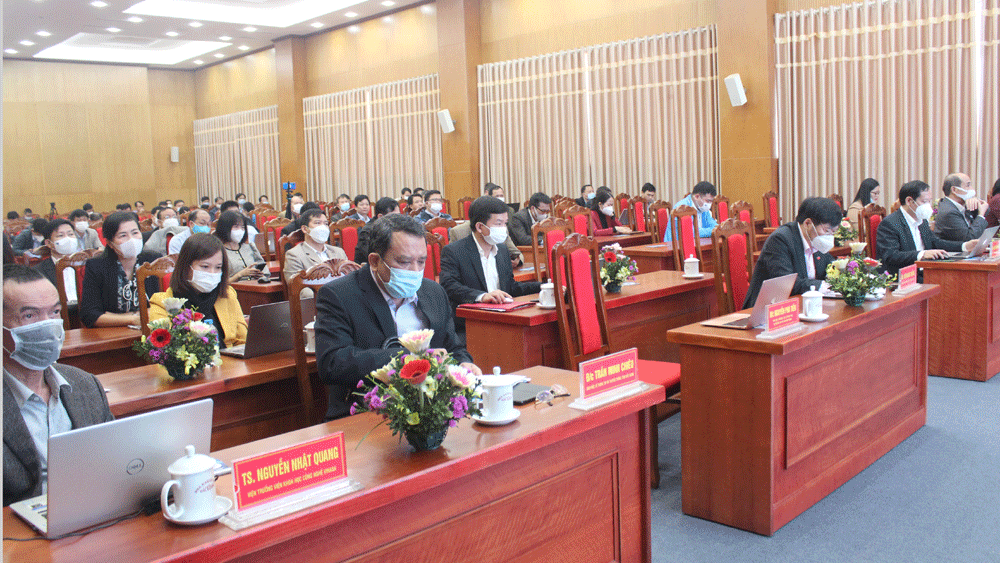Hanoi (VNA) – The northern province of Bac Giang is exerting all-out efforts to increase its service industry by an average 10 – 11 percent annually from 2021 – 2030, according to the provincial People’s Committee.
The province aims for services to occupy some 23.6 percent to the economy this year alone.
In 2022, Bac Giang plans to focus efforts on develop supporting services and those it has potential and advantages. The province is accelerating the construction of Tan Tien and Dong Son Ports and a rest station at the international logistics centre in the provincial capital Bac Giang City.
It also intends to make the most of free trade agreements Vietnam is a signatory to and ramp up trade promotion with major corporations as well as neighbouring provinces and large cities, such as Hanoi and Ho Chi Minh City, to boost the sale of agricultural products.
It will build multiple inter-district wholesale goods and services centres at gateways and in urban areas and those where there are industrial parks and clusters.
By 2030, Bac Giang expects to have 46 supermarkets, 14 shopping malls and 142 wet markets. Its capital, Bac Giang City, will be developed as the province’s main hub for trade and services while Thang Township (Hiep Hoa) and Chu Township (Luc Ngan) will become that in the west and the east, respectively.
The province wants to build a regional centre for foreign trade and promotion of its signature products while making more local goods available on e-commerce sites. It will also facilitate the development of shopping tourism to attract more visitors.
Last year, Bac Giang started promoting and selling its renowned specialty, litchi, on various online marketplaces, including Voso.vn, Postmart.vn, Sendo.vn, San24h.vn, Shopee.vn, Lazada.vn… and international platform Alibaba.com.
It was the first time that Bac Giang had sold more than 8,000 tonnes of litchi through online distribution channels, of which more than eight tonnes were exported to European countries.
Additionally, the province will lure more investment into developing logistics, warehousing, transport, product preservation, repair and maintenance services, among others; and expand the network of banks and credit institutions.
Notably, the province will further bolster the growth of tourism. Bac Giang aims to develop eco-tourism and leisure tourism and organise cultural, entertainment and sports events to boost the smoke-free industry between now and 2030, in the hope of not only serving local residents but also visitors from Hanoi and nearby regions.
Furthermore, Bac Giang is planning to develop three local destinations into national tourist sites, namely West Yen Tu complex which links to a host of pagodas – Vinh Nghiem, Bat Nha, Ham Long, Am Vai, and Tay Yen Tu; and Luc Ngan and Nham Bien eco-tourism, leisure, sports and entertainment complexes.
Despite many COVID-19 impacts, the province’s service sector rose by 3.8 percent in 2021, with its value reaching 42.73 trillion VND (1.87 billion USD).
The province has been improving infrastructure for trade and commerce to provide local customers and sellers with more modern and sustainable platforms. Total retail sales of goods and services exceeded 34.03 trillion VND last year, up 9.2 percent from the same period of 2020.
Revenue from foreign trade hit about 30.7 billion USD last year. Its largest importers included China, the Republic of Korea, the US, India and Spain. The province mainly shipped abroad textile and garment, computers, electronics, phones and parts, and electric devices.
Total outstanding loans hit over 75.71 trillion VND. Turnover from postal, Internet and telecommunication services totalled some 2.55 trillion VND while that from tourism was estimated at around 137 billion VND./.
The province aims for services to occupy some 23.6 percent to the economy this year alone.
In 2022, Bac Giang plans to focus efforts on develop supporting services and those it has potential and advantages. The province is accelerating the construction of Tan Tien and Dong Son Ports and a rest station at the international logistics centre in the provincial capital Bac Giang City.
It also intends to make the most of free trade agreements Vietnam is a signatory to and ramp up trade promotion with major corporations as well as neighbouring provinces and large cities, such as Hanoi and Ho Chi Minh City, to boost the sale of agricultural products.
It will build multiple inter-district wholesale goods and services centres at gateways and in urban areas and those where there are industrial parks and clusters.
By 2030, Bac Giang expects to have 46 supermarkets, 14 shopping malls and 142 wet markets. Its capital, Bac Giang City, will be developed as the province’s main hub for trade and services while Thang Township (Hiep Hoa) and Chu Township (Luc Ngan) will become that in the west and the east, respectively.
The province wants to build a regional centre for foreign trade and promotion of its signature products while making more local goods available on e-commerce sites. It will also facilitate the development of shopping tourism to attract more visitors.
Last year, Bac Giang started promoting and selling its renowned specialty, litchi, on various online marketplaces, including Voso.vn, Postmart.vn, Sendo.vn, San24h.vn, Shopee.vn, Lazada.vn… and international platform Alibaba.com.
It was the first time that Bac Giang had sold more than 8,000 tonnes of litchi through online distribution channels, of which more than eight tonnes were exported to European countries.
Additionally, the province will lure more investment into developing logistics, warehousing, transport, product preservation, repair and maintenance services, among others; and expand the network of banks and credit institutions.
Notably, the province will further bolster the growth of tourism. Bac Giang aims to develop eco-tourism and leisure tourism and organise cultural, entertainment and sports events to boost the smoke-free industry between now and 2030, in the hope of not only serving local residents but also visitors from Hanoi and nearby regions.
Furthermore, Bac Giang is planning to develop three local destinations into national tourist sites, namely West Yen Tu complex which links to a host of pagodas – Vinh Nghiem, Bat Nha, Ham Long, Am Vai, and Tay Yen Tu; and Luc Ngan and Nham Bien eco-tourism, leisure, sports and entertainment complexes.
Despite many COVID-19 impacts, the province’s service sector rose by 3.8 percent in 2021, with its value reaching 42.73 trillion VND (1.87 billion USD).
The province has been improving infrastructure for trade and commerce to provide local customers and sellers with more modern and sustainable platforms. Total retail sales of goods and services exceeded 34.03 trillion VND last year, up 9.2 percent from the same period of 2020.
Revenue from foreign trade hit about 30.7 billion USD last year. Its largest importers included China, the Republic of Korea, the US, India and Spain. The province mainly shipped abroad textile and garment, computers, electronics, phones and parts, and electric devices.
Total outstanding loans hit over 75.71 trillion VND. Turnover from postal, Internet and telecommunication services totalled some 2.55 trillion VND while that from tourism was estimated at around 137 billion VND./.
VNA

























